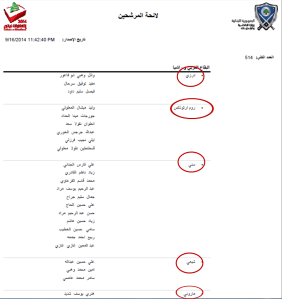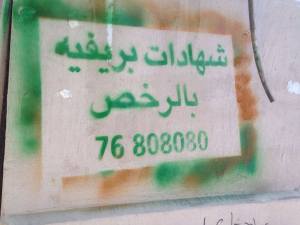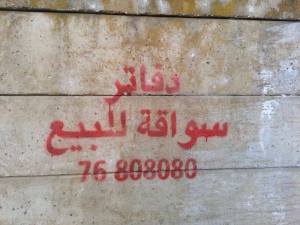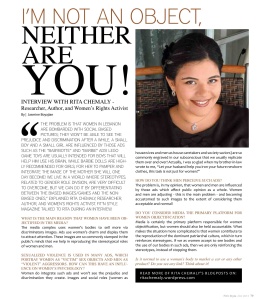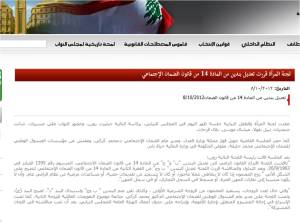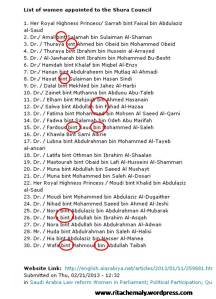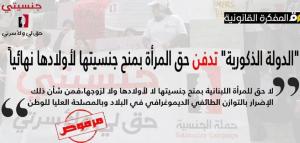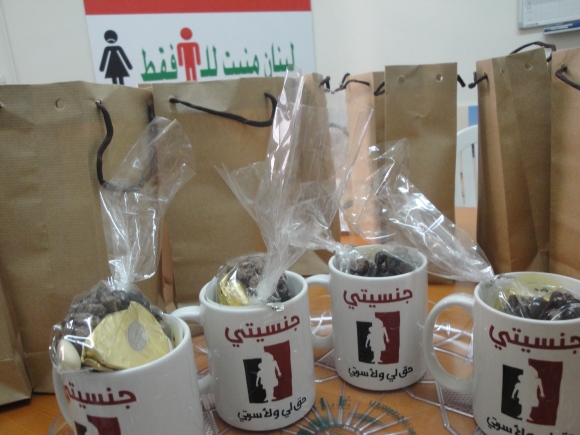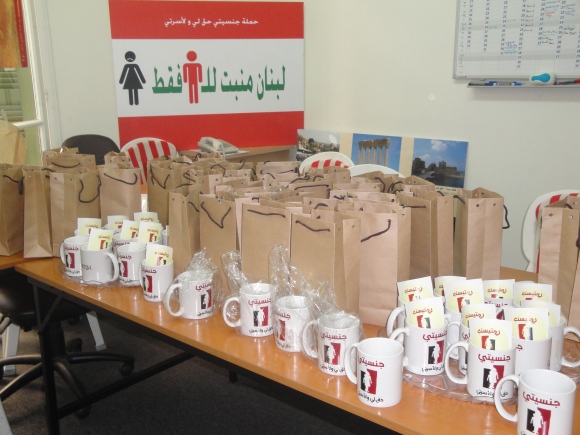Les élections libanaises de mai 2022, des élections en demie teinte dans un pays en crise et un système sclérosé, Afkar/ Idees 2022
“Cette analyse a été rédigée par Rita Chemaly, Enseignante, chercheure à l’Institut des Sciences Politiques de l’Université Saint-Joseph de Beyrouth, Liban 2022.
1-Contextualisation des élections dans un Etat en désintégration
Au mois de mai 2022, les libanais et libanaises âgés de plus de 21 ans ont eu la possibilité d’élire leurs représentants au parlement. Les élections législatives ont été tenues alors que le Liban vit une crise financière et économique grave. Crise classée par la Banque mondiale en juin 2021 « parmi les 10, voire les 3 crises mondiales les plus sévères depuis le milieu du XIXe siècle ».
Elections organisées, trois ans après les contestations du mouvement d’Octobre 2019 qui avait cristallisé la colère des citoyens et citoyennes contre la classe politique.
Les élections ont été organisées aussi, 2 ans après l’explosion du 4 aout 2020 qui a détruit la capitale Beyrouth et une grande partie de ses banlieues, et tué plus de 230 victimes selon le collectif des familles des victimes avec des milliers de blessés et des déplacés.
Les élections ont été tenues en plusieurs jours, deux jours pour les élections des libanais vivant à l’étranger et un jour pour les libanais vivant au Liban.
Le ministère de l’intérieur et des municipalités qui a administré la tenue des élections a fait face à la désintégration des services étatiques, notamment la grève des employés du secteur public, ajouter à des coupures sévères du courant électrique qui devait être payé en dollars « frais » pour fournir les écoles publiques et municipalités où avaient lieu les élections sur tout le territoire libanais. L’expression dollars frais selon le nouveau contexte libanais signifie des dollars « cash » qui n’étaient pas déposés dans les banques libanaises avant la crise d’octobre 2019. La désintégration des services étatiques se traduit dans les administrations par le manque sévère de fournitures et matériels logistiques, aux fonctionnaires démotivés qui devaient ouvrir et administrer des bureaux de vote alors que payer le transport pour aller au bureau qu’ils devaient gérer devenait hors de portée. Cela dû à l’augmentation des prix du carburant et de l’essence au Liban, aussi dû à l’hyperinflation, et à la perte de valeur de la monnaie nationale, qui fait que les salaires des employés ne leur suffisent plus pour couvrir leur simple transport vers leur lieu de travail, ni pour gérer leurs dépenses quotidiennes.
Les citoyens et citoyennes vivent une hyperinflation de 154.8 % (selon le gouvernement libanais étude présentée en mai 2022 aux créditeurs et publiée sur le site du ministère des finances) , l’augmentation des prix des transports de plus de 541% en un an selon le Département National de Statistiques, et la perte de plus de 95 % de la valeur de la monnaie nationale, la livre libanaise. Aussi, les élections ont été organisées alors que les citoyens qui avaient des comptes dans les banques vivent aussi des restrictions sur les retraits en devises étrangères et en monnaie nationale, restrictions mises en place par le secteur bancaire, et non par une loi, au parlement. Les dépôts sont gelés et ont perdu leur valeur. Notamment depuis l’implosion du système Ponzi, qui a été mis en place depuis plus de trente ans, pour attirer les capitaux a des taux d’intérêts élevés.
Le jour des élections au Liban, le 15 mai 2022, les électeurs et électrices ont dû aussi aller à leur village d’origine pour pouvoir voter puisque les mégacentres c’est-à-dire des centres qui selon la loi permettent aux citoyens de voter à proximité de leur lieu de vie, n’ont pas été développés, par manque de volonté politique et de moyens. Cela a augmenté l’incertitude quant au déplacement des libanais.es vers les centres de vote, notamment dues à la crise économique et financière.
Les élections étaient une étape clé attendue, et demandée au Liban. La communauté internationale, les associations pour la démocratie ont insisté pour leur tenue. Selon Antonio Guterres le Secrétaire Général des Nations Unies, «… le nouveau Parlement se doit d’adopter d’urgence toutes les lois nécessaires à la stabilisation de l’économie et à l’amélioration de la gouvernance. » En effet, les questions prioritaires mises sur l’agenda lors de cette phase électorale, étaient celles des dépôts bancaires, le pouvoir d’achat, la dévaluation de la monnaie, le prix des services médicaux et de santé, ainsi que la désintégration des administrations publiques et la consolidation d’un Etat de droit souverain, détenteur de la violence symbolique avec des armes aux mains de l’Etat seul, pas aux mains d’un parti comme le Hezbollah.
John W. Kingdon dans son ouvrage paru en 1984, Agendas, Alternatives and Public Policies, montre clairement que dans des « périodes de grands changements politiques, l’agenda est ouvert », les élections libanaises dans un contexte aussi fertile en évènements, et avec des indicateurs qui changent étaient perçues comme un tournant important qui permet de changer le paysage politique, répondre à l’explosion du port de Beyrouth et à l’implosion de la société et à ceux qui font en sorte d’arrêter les poursuites judiciaires, mesurer le poids des divers camps politiques et leur représentativité, offrir dans le langage systémique de nouvelles demandes de la part des responsables et répondre aux demandes de la population. (David Easton parle de pressions et de demandes qui entrent dans le système et qui en ressortent en outputs) ; Les demandes avant les élections étaient nombreuses, une mesure de la représentativité des blocs, l’accountability d’une classe politique dominante qui n’a pas pris de mesures contre le grand effondrement économique et financier, ni mener la guerre à l’impunité, et la grande question du désarmement du Hezbollah.
Au vu de la situation économique et sociale, comment interpréter les résultats des élections de ce printemps 2022, quels enseignements tirer au vu de la crise financière et économique la plus sévère du monde ?
Les élections sont une des périodes phares pour le changement, les élections permettent aux cartes de se redistribuer, à des alliances de se cristalliser, se défaire ou se consolider, à des projets d’être mis en exergue. Quels changements les élections libanaises de mai 2022 vont amorcer dans l’équation politique, numériquement, et dans le fond ? Quel est l’impact des élections sur l’identification de nouveaux leaders et mouvements et partis sur la scène nationale ? La kleptocratie libanaise a été tant de fois dénigrée avant les élections, quel effet, ce tournant que sont les élections, vont avoir sur l’élite politique, une nouvelle élite pourra-t-elle émerger, une élite plus centrée autour de questions liées à la justice sociale et à l’Etat de droit, ou la même kleptocratie va garder le même poids dans les choix mis sur l’agenda du parlement après les élections ? Quel impact sur le système consociatif libanais, basé sur une distribution des postes sur des bases communautaires et géographiques ?
Après, avoir introduit le contexte, et pour offrir une analyse des résultats des élections libanaises, nous allons passer en revue plusieurs indicateurs :
La loi électorale, le taux de participation et d’abstention, la dispersion des votes entre diverses listes et candidats.es, la participation des femmes en politique, et les percées de nouvelles figures politiques sur la scène parlementaire.”
Pour lire l’article dans son integralite,



